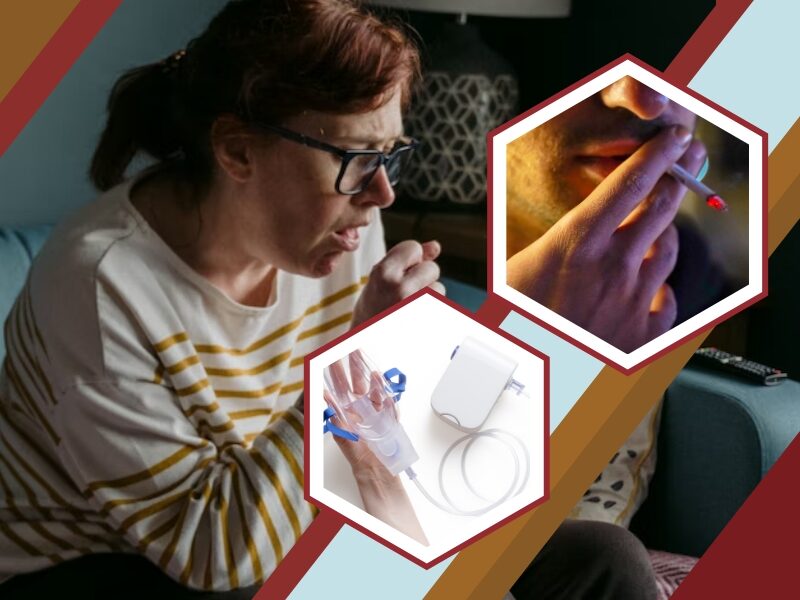What are the Effects of Smoking?

Smoking is done by people who want to release stress, feel pleasure, or go along in social situations. Nicotine is the main addictive substance in cigarettes and other forms of tobacco. Chronic smoking affects many parts of your body, including your brain.
Why Do People Smoke?
Addiction is the main reason why people smoke. Nicotine reaches your brain within 10 seconds of when it enters your body. It causes the brain to release adrenaline, and that creates a buzz of pleasure and energy. It can also be due to other activities of your day-to-day life such as watching TV, talking on the phone, hanging out with friends, going to certain places, or taking a break to relax. Then smoking becomes a part of a pattern or routine.
Symptoms of Chronic Smoking

- You cannot stop or control it. You’ve made one or more serious, but unsuccessful attempts to stop.
- You keep smoking despite health problems. You haven’t stopped smoking despite lung or heart problems.
- You keep yourself from social acts. As a result, you may stop going to smoke-free restaurants or socializing with friends and family.
- You have withdrawal symptoms when you try to stop. Stopping has resulted in physical and psychological symptoms, including cravings, anxiety, irritability, restlessness, difficulty concentrating, depressed mood, frustration, anger, increased hunger, insomnia, constipation, and diarrhea.
What are the Effects of Smoking?
For every person who dies because of smoking, at least 30 people live with a serious smoking-related illness. Chronic obstructive pulmonary disease, including emphysema and chronic bronchitis, is caused by smoking. It also increases the risk of tuberculosis, certain eye diseases, and problems of the immune system, including rheumatoid arthritis.
Secondhand smoke exposure contributes to approximately 41,000 deaths among nonsmoking adults and 400 deaths in infants each year. Secondhand smoke causes stroke, lung cancer, and coronary heart disease in adults. Secondhand smoke exposure increases the risk of sudden infant death syndrome, acute respiratory infections, middle ear disease, asthma symptoms, and slowed lung growth in children.
What Happens When You Stop Smoking?
One day after smoking may reduce your risk of heart attacks. Three days after quitting smoking, the nicotine levels in a person’s body are depleted. While it is healthier to have no nicotine in the body, this initial depletion can cause nicotine withdrawal.
After a month, your lung function starts to improve and increase your endurance. Nine months after quitting, the lungs have significantly healed themselves. The delicate, hair-like structures inside the lungs known as cilia have recovered from the toll cigarette smoke took on them.
To quit smoking is not as easy as one snap. It will also cause withdrawal symptoms. Talk to your doctor about a proper plan for quitting smoking. Your doctor may provide a lifestyle plan and healthier options to aid you in making changes in your body.
Treatment for Smoking Addiction

To stop smoking, your doctor may recommend the use of medications and counseling, which have both been proven effective, especially in combination. Some quit-smoking products are known as nicotine replacement therapy because they contain varying amounts of nicotine. These will help you reduce the frequency of your withdrawal symptoms. Although you can buy some quit-smoking products without a prescription, it’s a good idea to talk to your doctor first.
Counseling will help you develop the skills you need to give up tobacco for good. You learn techniques you can use to help you stop smoking. Many hospitals, health care plans, health care providers, and employers offer treatment programs. During the treatment, you should avoid certain smoking methods including vapes or electronic cigarettes. E-cigarettes have not proved to be safe nor are they more effective in helping people stop smoking than nicotine replacement medications.
Recommended Product to Quit Smoking
Bupropion is used as a smoking cessation aid and also as an anti-depressant. It belongs to a class of aminoketones and reduces the cravings for nicotine and it also reduces the severity of withdrawal symptoms. It acts as a reuptake inhibitor on two of the brain chemical namely dopamine and norepinephrine. The drug replaces these chemicals in the neurotransmitter and blocks it from being transported to the nerve terminal.



